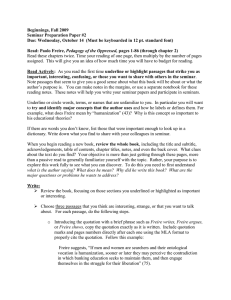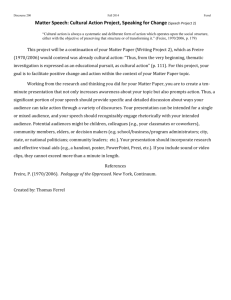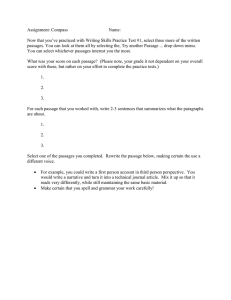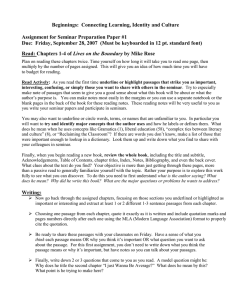Beginnings: Connecting Learning, Identity and Culture
advertisement
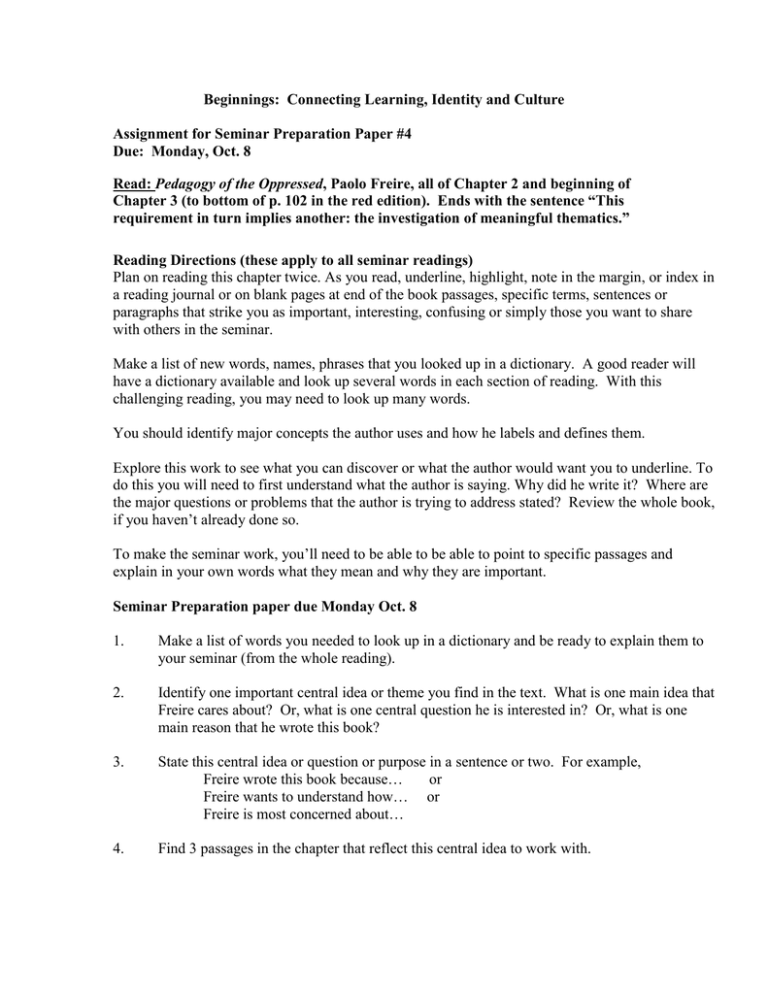
Beginnings: Connecting Learning, Identity and Culture Assignment for Seminar Preparation Paper #4 Due: Monday, Oct. 8 Read: Pedagogy of the Oppressed, Paolo Freire, all of Chapter 2 and beginning of Chapter 3 (to bottom of p. 102 in the red edition). Ends with the sentence “This requirement in turn implies another: the investigation of meaningful thematics.” Reading Directions (these apply to all seminar readings) Plan on reading this chapter twice. As you read, underline, highlight, note in the margin, or index in a reading journal or on blank pages at end of the book passages, specific terms, sentences or paragraphs that strike you as important, interesting, confusing or simply those you want to share with others in the seminar. Make a list of new words, names, phrases that you looked up in a dictionary. A good reader will have a dictionary available and look up several words in each section of reading. With this challenging reading, you may need to look up many words. You should identify major concepts the author uses and how he labels and defines them. Explore this work to see what you can discover or what the author would want you to underline. To do this you will need to first understand what the author is saying. Why did he write it? Where are the major questions or problems that the author is trying to address stated? Review the whole book, if you haven’t already done so. To make the seminar work, you’ll need to be able to be able to point to specific passages and explain in your own words what they mean and why they are important. Seminar Preparation paper due Monday Oct. 8 1. Make a list of words you needed to look up in a dictionary and be ready to explain them to your seminar (from the whole reading). 2. Identify one important central idea or theme you find in the text. What is one main idea that Freire cares about? Or, what is one central question he is interested in? Or, what is one main reason that he wrote this book? 3. State this central idea or question or purpose in a sentence or two. For example, Freire wrote this book because… or Freire wants to understand how… or Freire is most concerned about… 4. Find 3 passages in the chapter that reflect this central idea to work with. 5. For each of the three passages, do the following: Introducing the quotation with a signal phrase* of your own, copy the passage using MLA style citation. For example: Freire asserts that “problem-posing education, as a humanist and liberating praxis, posits as fundamental that the people subjected to domination must fight for their emancipation” (86). Paraphrase the passage; put it in your own words. Don’t just go for the gist – try to capture every part of the original passage in your version. For example: An education based on solving problems, as a practice that frees people and helps them become more themselves, starts with the idea that people who are oppressed must struggle for liberation. Then write a paragraph in which you reflect on how this particular passage relates to or supports your theme statement. Why does this passage seem especially significant to you? How does it relate to the central idea you identified? What about it “jumps out” at you? Include your questions about the passage or the larger idea. It’s fine to write “I’m not sure if…” Or “Could this mean …” 6. Repeat this process for each of your three passages. Your seminar paper will include the following: List of words you needed to look up. Your theme statement. Passage #1, paraphrase, and reflective paragraph. Passage #2, paraphrase, and reflective paragraph. Passage #3, paraphrase, and reflective paragraph. 7. Follow the format guidelines in the syllabus. *A signal phrase is an introductory phrase that sets up a quote to follow. For example: Freire writes… Freire shows the reader… The author points out… The author reflects… Freire argues… The author depicts…
